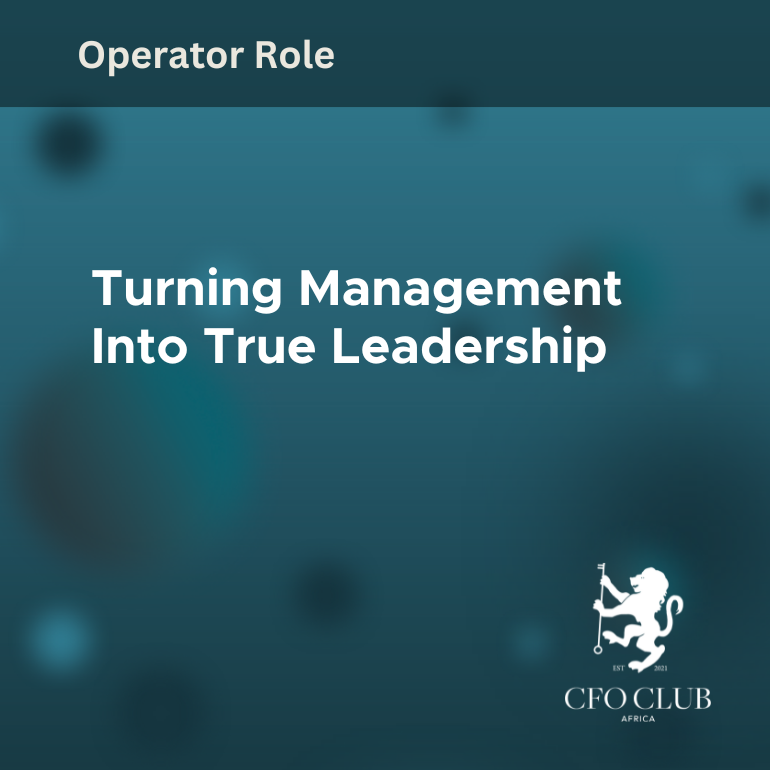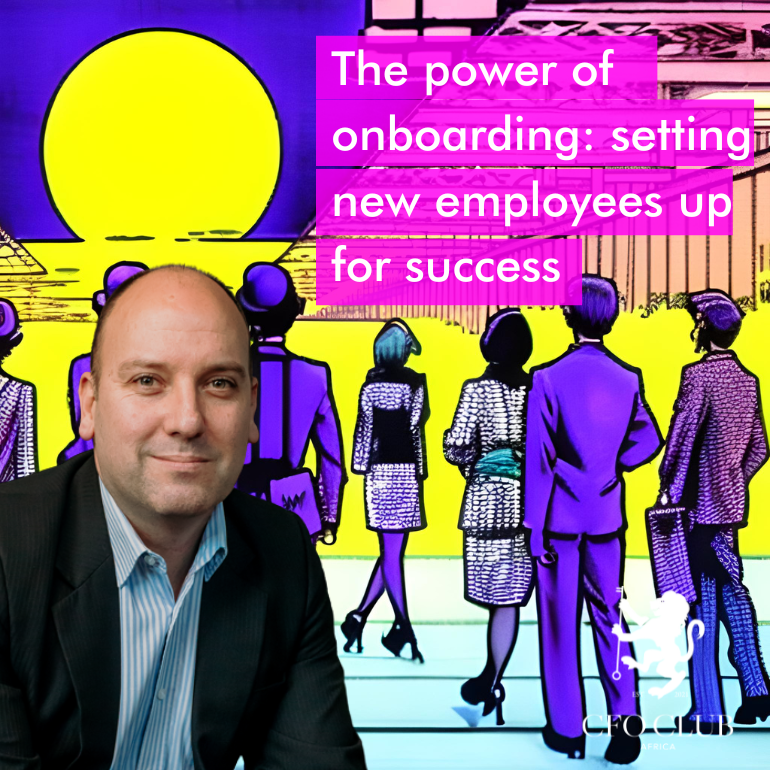If You Left Tomorrow, Would Anything Break?
If You Left Tomorrow, Would Anything Break?
If your finance team is unable to make decisions without first asking you, your risk exposure is higher than you think.
You may be technically excellent, have a sharp grasp of reporting standards, and maintain control of every budget, but if your ability to lead and think does not extend to your team, you are leaving the business exposed. And if something goes wrong, you will be the one explaining to the board why nobody else could step in.
Mentoring is not a nice-to-have. It is not about motivational talks or performance reviews. It is a hard control mechanism. It builds capability, transfers judgment, and protects both continuity and credibility. A CFO who mentors intentionally protects the business, the function, and their own professional standing.
This article cuts through the jargon. It is written for CFOs who understand that operational strength depends on people who can think, act, and lead when they are not in the room.
Mentoring is Not a Soft Skill. It Is a Control.
Most finance teams can deliver reports. They can reconcile accounts, update forecasts, and manage audit schedules. But few can apply judgement in grey areas, navigate stakeholder politics, or anticipate risks outside the spreadsheet. These are not textbook skills. They are learned through exposure, guided decision-making, and structured mentoring.
Mentoring reduces your risk in three specific ways.
First, it prevents key person dependency. When you are the only person who understands the revenue drivers, the banking covenants, or the internal control design, you become a single point of failure.
Second, it enables performance at scale. A mentored team can take on more responsibility, operate more independently, and handle complexity without escalating every issue to you.
Third, it builds succession depth. Whether someone resigns, is promoted, or goes on extended leave, there should always be someone ready to step in. That only happens when you have invested in building internal capability.
Why Most Mentoring Fails in Finance
Most mentoring fails because it is vague, inconsistent, and too focused on comfort. Informal chats, career coaching, or technical tutorials may feel helpful in the moment, but they do not deliver operational value unless tied to business outcomes.
Mentoring efforts usually fail for one of three reasons.
First, the CFO mentors the wrong people. They focus on staff who are likeable or available, rather than those with the highest potential or the greatest strategic gap to close.
Second, they set no targets. Without outcomes, there is no accountability, no feedback loop, and no clarity on whether the time is well spent.
Third, mentoring gets deprioritised. When reporting season, audits, or board meetings come up, mentoring is the first thing to fall away.
If you want mentoring to work, it must be treated as a structured, trackable leadership activity. Otherwise, it becomes a distraction instead of a development lever.
Build a Mentoring System That Protects the Business
CFOs do not need a mentoring programme. They need a mentoring system that works within their current operating structure. The goal is not to inspire. The goal is to shift capability in areas that directly support business performance and reduce the CFO’s exposure.
The first step is to choose the right people. Not everyone should be mentored. Choose team members who have demonstrated technical competence, have shown potential to influence beyond their level, and are willing to be challenged. This is not a reward for good behaviour. It is an investment in functional strength.
The second step is to set outcomes. Each mentee should have three specific goals that link to the finance strategy. Examples include presenting the board pack without assistance, managing an audit query independently, or leading a monthly close process across departments. If you cannot track improvement, you are not mentoring effectively.
The third step is to log and review progress. You do not need a formal system. A shared document or private notes will suffice. Record what has been discussed, what the mentee is expected to action, and where gaps remain. This creates continuity, avoids repetition, and provides a clear record of progress.
What Finance Teams Do Not Learn From Qualifications
Mentoring is most effective when it covers the areas that cannot be learned in exams. Most mentees already know how to calculate ratios or reconcile accounts. What they do not know is how to navigate the grey zones.
A good CFO mentor teaches decision-making under pressure. Mentees need to learn how to make sound choices when the data is incomplete, the stakeholders are pushing back, and the consequences are not easily quantified. These scenarios happen every day in senior finance roles, and they must be taught through exposure and real-time feedback.
A good CFO mentor also teaches how to uphold ethical boundaries. It is easy to apply policy when there is a clear rule. It is harder when the business is under pressure, and shortcuts are quietly encouraged. Show your mentees how you handle grey situations, how you defend your decisions, and how you remain credible with both the board and the business.
Lastly, mentees must learn how to translate finance for non-financial people. They need to know how to explain the financial implications of operational changes, how to influence without alienating, and how to hold the room when nobody wants to hear what the numbers say. These are the skills that protect your team’s relevance in the broader business.
Practical Mentoring Examples That Work
Mentoring does not need to be abstract. If you are mentoring a finance manager who struggles with presenting to stakeholders, do the following. Give them a board pack that has already been reviewed, and ask them to brief you as if you are a non-financial director. Then give them specific feedback on what they communicated well, what lacked clarity, and where they relied too heavily on jargon.
If a mentee is managing a month-end process but constantly runs late, mentor them through a risk map. Help them identify which steps delay the process, which controls are redundant, and how to re-sequence tasks to improve efficiency. The lesson is not just time management. It is process ownership.
Mentoring is about walking them through the thinking behind your actions, not just correcting their outputs.
What CFOs Gain from Mentoring
Mentoring is not a one-way investment. It delivers measurable value to the CFO.
First, it reduces time spent on low-value reviews and repeated corrections. A mentored team delivers cleaner outputs, asks better questions, and escalates less often.
Second, it reduces personal liability. The CFO is no longer the sole knowledge holder or decision-maker in critical moments. That reduces the chance of oversight, error, or exposure.
Third, it builds a reputation for leadership. Boards and CEOs notice when a CFO builds a strong team. It positions you as a strategic leader, not just a reporting specialist.
Avoid These Common Mentoring Mistakes
Do not mentor only those who remind you of yourself. The team needs a range of strengths. Your role is to lift others, not clone yourself.
Do not turn mentoring into therapy. Focus on capability, accountability, and results. You are there to build strength, not soothe insecurities.
And most importantly, do not drop mentoring when things get busy. If you stop when pressure builds, you teach your team that mentoring is not essential. That message will cost you later.
Make Mentoring a Core CFO Discipline
To begin, choose one or two team members who have the potential to step up in the next twelve months. Define what success looks like. Block regular time with them and treat those sessions as non-negotiable. Apply the same discipline you use for financial reporting or audit preparation.
Mentoring is not extra work. It is the work that protects everything else.
If you want a finance team that can operate without you, think without prompting, and take ownership of problems before they escalate, start mentoring with intention today.
This is how CFOs build credibility, strengthen their teams, and secure their legacies.





